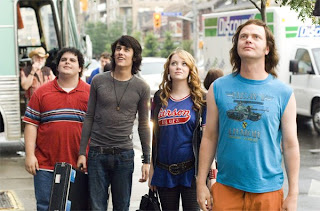Go Ahead - Lie to Me
By Alison Bruce
"Micro expressions are very brief facial expressions, lasting only a fraction of a second. They occur when a person either deliberately or unconsciously conceals a feeling. Seven emotions have universal signals: anger, fear, sadness, disgust, contempt, surprise and happiness. . . ."
Paul Ekman (http://www.paulekman.com/micro-expressions)
When I was wondering what to write about this week, my daughter had this to offer.
"You know how you and Dad keep staring at me to see if I'm lying - using that stuff you learn watching Lie to Me? You should talk about that."
Why not? I was heartbroken when that show was cancelled, not only because I enjoyed the stories and thought Cal Lightman was hot. It was a great research tool for a mystery writer and not a bad one for a single mom either.
Practicing your lie-detecting skills on your kids is fun and potentially profitable. Of course, their micro-expressions are more like midi-expressions. It takes years of practice to keep your mask up when telling a lie. Not that my kids are chronic prevaricators. But my son tends to be selective about the truth when he thinks it will embarrass him and my daughter likes to think she's protecting me. I sympathize. When I was a teen, I regularly lied by omission for the same reasons.
Of course, I never do that now.
"I Speak Two Languages, Body and English"
Mae West
If say you one thing and your body language says another - guess which one people are going to believe?
Most of us read body language unconsciously. We know something is off or true almost instinctively. Studying body language gives us a greater understanding of what clues we are picking up. It's also very useful in making your characters' actions match your intentions.
The shoulder lift and crossed arms of the witness being questioned tell us that he is on the defensive and either holding back, lying or not as sure of their information as they'd like the police to believe.
The woman, legs crossed, tilting her head to listen to the cop, is comfortable with the situation and attracted to that tall dark and handsome man in uniform.
And yes, I've used that knowledge on my children too. The reflexive half shrug is a good tell that I'm not getting the whole story. Then they'll catch me tilting my head or playing with my hair when I'm talking to an attractive man. My words may be cool as a cucumber, but they'll know better and taunt me for it. What goes around, comes around.
"Micro expressions are very brief facial expressions, lasting only a fraction of a second. They occur when a person either deliberately or unconsciously conceals a feeling. Seven emotions have universal signals: anger, fear, sadness, disgust, contempt, surprise and happiness. . . ."
 |
| www.paulekman.com |
When I was wondering what to write about this week, my daughter had this to offer.
"You know how you and Dad keep staring at me to see if I'm lying - using that stuff you learn watching Lie to Me? You should talk about that."
Why not? I was heartbroken when that show was cancelled, not only because I enjoyed the stories and thought Cal Lightman was hot. It was a great research tool for a mystery writer and not a bad one for a single mom either.
Practicing your lie-detecting skills on your kids is fun and potentially profitable. Of course, their micro-expressions are more like midi-expressions. It takes years of practice to keep your mask up when telling a lie. Not that my kids are chronic prevaricators. But my son tends to be selective about the truth when he thinks it will embarrass him and my daughter likes to think she's protecting me. I sympathize. When I was a teen, I regularly lied by omission for the same reasons.
Of course, I never do that now.
"I Speak Two Languages, Body and English"
Mae West
If say you one thing and your body language says another - guess which one people are going to believe?
Most of us read body language unconsciously. We know something is off or true almost instinctively. Studying body language gives us a greater understanding of what clues we are picking up. It's also very useful in making your characters' actions match your intentions.
The shoulder lift and crossed arms of the witness being questioned tell us that he is on the defensive and either holding back, lying or not as sure of their information as they'd like the police to believe.
The woman, legs crossed, tilting her head to listen to the cop, is comfortable with the situation and attracted to that tall dark and handsome man in uniform.
And yes, I've used that knowledge on my children too. The reflexive half shrug is a good tell that I'm not getting the whole story. Then they'll catch me tilting my head or playing with my hair when I'm talking to an attractive man. My words may be cool as a cucumber, but they'll know better and taunt me for it. What goes around, comes around.
 |
| www.paulekman.com |

Comments
Post a Comment
We would love to hear from you but hope you are a real person and not a spammer. :)